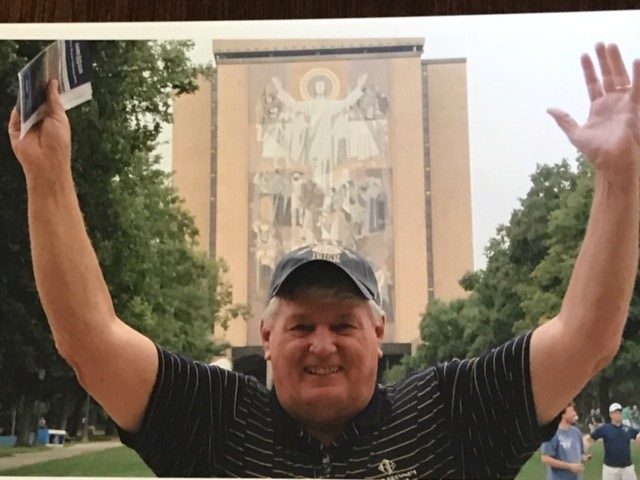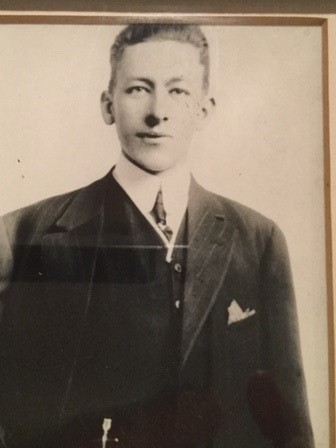
Mike Busch’s funeral service was held on Tuesday April 16th. Below is a complete video of that service. I was one of several eulogists. This post repeats several items from that eulogy (0:57:54 minutes to 1:12:02 minutes in the video). Mike and his wife Cindy were married for 25 years and their daughters, Erin and Megan stole the show (1:31:16 minutes to 1:37:22 minutes). https://bit.ly/2IBPeOy
On Sunday, April 7, 2019 at 3:22 p.m. (EDT), my best friend, Michael Erin Busch, died. Flags in Maryland were lowered to half-mast as he was the longest serving Speaker of the Maryland House of Delegates and a formidable, respected and well-liked political leader.
We have been friends since 1986 and weekly golfing partners where we fought over a two dollar Nassau bet as if it were a fish caught between two cats. We referred to that bet as the “death match” and, for us, no other bet in the golf foresome really mattered.
I called him “Mikey”
The rest of the world called him Mike or, more often, “Mr. Speaker” as he had presided over the Maryland House of Delegates for 17 years. Years ago, a political opponent said about a Maryland governor that “he was like a baboon because the higher he went up the political tree the more you saw of his ass”. When I mentioned this to Mikey, he replied, that this was not the case with him. He said the higher he went in politics the better looking and the smarter he became or so he was repeatedly told by lobbyists preening for his favor: “Delegate Busch, then Chairman Busch, then Speaker Busch, you are the ONLY ONE in the legislature who understands this particular issue, this particular industry or the need for this particular bill.”
One of H. L. Mencken’s more memorable quotes was about politicians: “A good politician is quite as unthinkable as an honest burglar.” Mencken never met Mikey who was not only a “good” politician but a great one and, boy, could he count, probably a leftover from when he doubled his starting teacher’s salary at weekend poker games (see Andrew Green’s remembrance in the Baltimore Sun: https://www.baltimoresun.com/news/opinion/editorial/bs-ed-0408-mike-busch-20190407-story.html).
For 17 years he presided over the fractious 141 member Maryland House of Delegates. He led them through contentious debates on same sex marriage, death penalty repeal, numerous bills aimed at affordable health care, casino gambling, and countless mundane matters, all the while presiding with good humor and openness to all.
Mikey was appalled by greed and self-dealing, both of which regularly reared their ugly heads in legislative proposals. Perhaps the clearest example of this occurred when he was Chair of the House Economic Matters Committee. The executives of CareFirst (Maryland Blue Cross and Blue Shield) proposed to take this “nonprofit” company public and to sell it to a California “for profit” insurance company. The real winners in the proposal: the executives themselves. CareFirst executives had lobbied this proposal well with the Governor and the Presiding Officers of the Legislature having given their “thumbs up.”
The hearing in the Senate Finance Committee could not have gone better for the CareFirst CEO who stood to cash in to the tune of $34 million. The hearing in Mikey’s Committee did not go so well for CareFirst. Not only were the executive payoffs questioned, but the issue became whether it was a sensible idea for the Maryland healthcare market to be determined in California. Mikey alone was savvy enough to organize outside lobbying groups against the proposal and with the help of a number of senators was able to turn the predetermined tide.
The final result: the CareFirst proposal was turned down; the CareFirst Board was reconstituted and it remains today a Maryland not-for-profit health insurer subject to the General Assembly and Maryland’s regulators.
Mikey was both funny and gregarious
One summer, I had a “Midsummer Night’s Dream Party” in which invitees were asked to repeat some portion of Shakespeare’s play. When Mikey’s turn came, he declaimed one of the famous soliloquies from that play:
“The outlook wasn’t brilliant for the Mudville nine that day / The score stood 4-2 with one inning to play / Then when Kearney died at first and Barrows did the same / A sickly silence fell upon the patrons of the game.”
13 stanzas later, Mikey delivered the final line: “but there is no joy in Mudville – mighty Casey has struck out.”
Too often to remember, my befuddled secretaries would interrupt a meeting saying things like “Jay, Joe Bagadonuts is on the line, says he is a new client and he’s about to be arrested and he must talk to you” or “Jay, Knute Rockne called but he wouldn’t leave a number, he said you had it.”
What makes a “best friend”?
I have a fair share of close friends but only 2 “best friends”, Mikey being one and a college classmate being the other. I think Mikey had probably four or five “best friends”. Typically, you and your best friend share a social and professional life together.
And, it seems that one has various “best friends” at various stages in their life. For example, my best friend in grade school calls me on my birthday every year and I try to call him on his (just to keep up) but I have only seen him four or five times in the last 50 some years. My best friend in high school died of AIDs at age 43, almost 30 years ago, and we lost touch almost immediately after our high school graduation when we went to different colleges and then different lives.
I do know one thing for certain. When your best friend leaves, there is a hole in your own life which he or she once occupied. Even after the grieving stops, that hole will remain as telephone calls will not be made, lunches not attended, jokes and pranks not shared, old stories not told and retold. And so as we grow older and lose family members, friends and “best friends,” we realize ‒ in the words of Mary Oliver ‒ “Doesn’t everything die at last, and too soon?”
Bucket List
Mikey’s “bucket list” included a trip to South Bend for the Temple/Notre Dame game. Temple was his alma mater where he had been a star football player and Notre Dame was mine where I watched the games from the stands. Temple played extremely well, satisfying Mike, and Notre Dame played slightly better, satisfying me. Otherwise, it would’ve been a very, very long ride home listening to him sing, and off key, the Temple fight song over and over again. I am quite sure that, if he knew all 13 stanzas of “Casey at the Bat,” he could more than muddle through the Temple fight song.
The second “bucket list” item was to visit the Baseball Hall of Fame in Cooperstown, New York. On the Wednesday before he died, he told me that, once he was out of the hospital, we were going to Cooperstown. This is not to be.
So Mikey, in the language of the Church when both of us were baptized 72 years ago, “Requiescat In Pace”.
But, too soon, Mikey, too soon.
